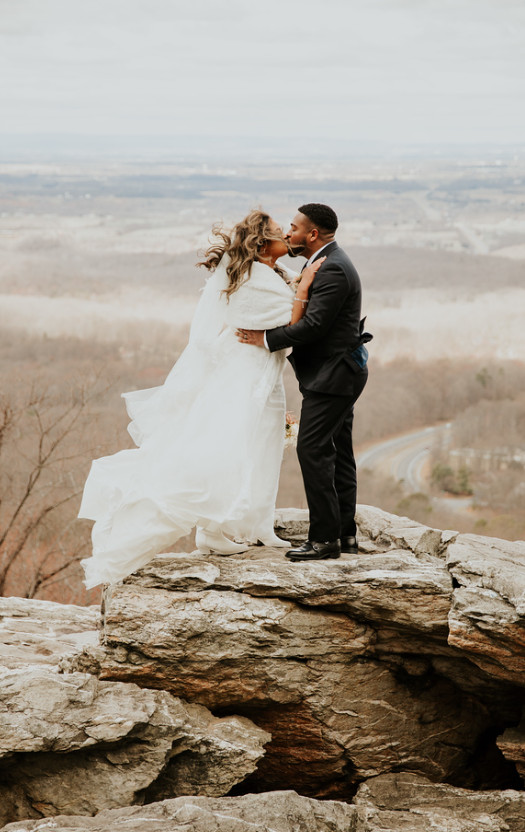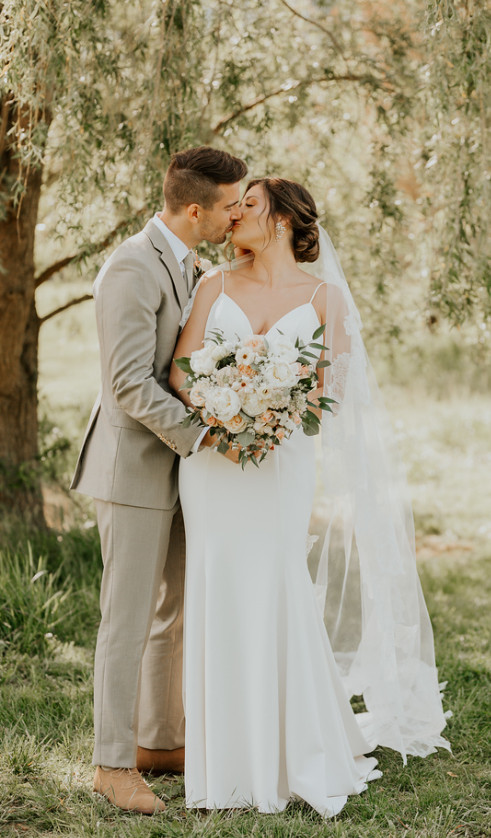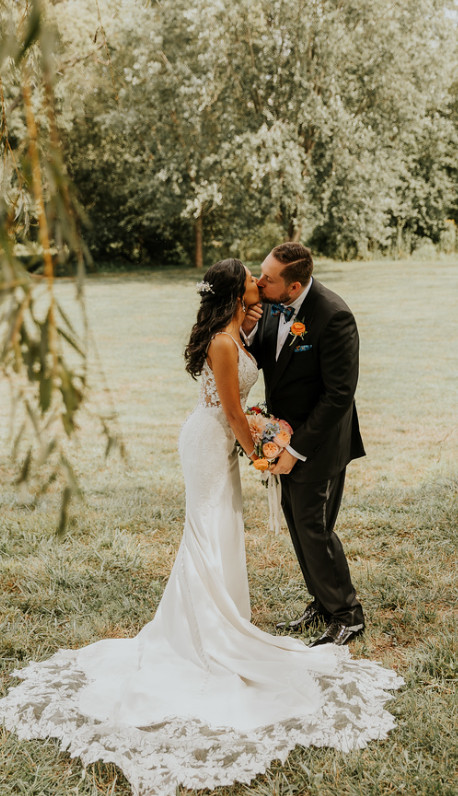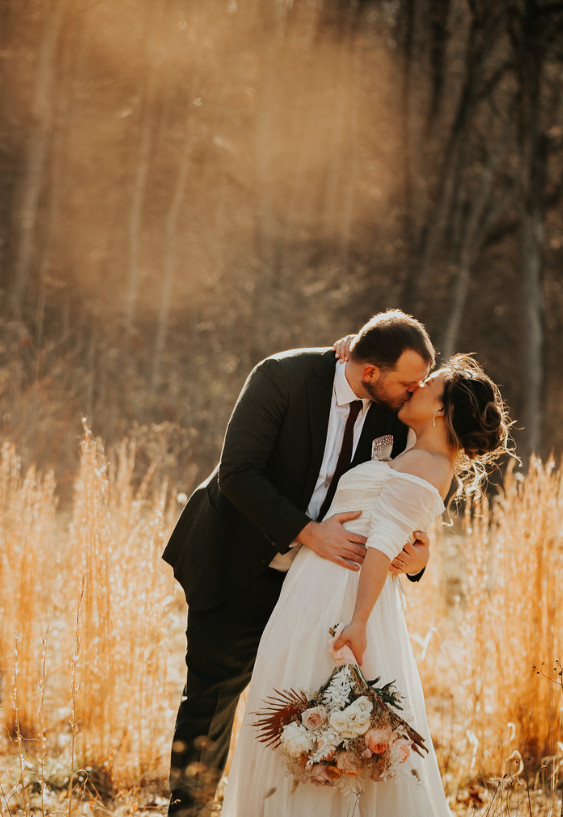By Terry Meadows
Table of Contents
4-minute read
Should you have a chic, snowy background with furry hand muffs and cozy fires for your wedding? Or are you looking more for a light and airy Spring flower celebration? You may be in the early stages of planning and need to know when is the absolute best time to have your wedding.
At Zion Springs, our expertise is in all-inclusive weddings, which gives us experience in all aspects of wedding planning, and we have a passion for informing couples about all the wedding industry has to offer. So, in this article, we want to share with you what you can expect for each season of the year and what best fits your dream wedding.
What to consider when choosing a season for your wedding
Choosing the right season for your wedding comes down to your vision of what you want for the celebration vibe and feel. You want to consider
Weather
Will it be steamy and hot in Summer, or will you take advantage of those glorious sunny days? Winter lends itself to beautiful snowy seasons, as well as biting cold winds. Spring explodes in color with all the blossoms bringing joy to your nuptials, as well as the allergies. And Fall has its gorgeous colors and spectacular storms during hurricane season.
Venue availability
Get ready to plan well in advance if you are looking for a Summer wedding, as it is traditionally the most popular season. If you plan on a Winter wedding, you might find some venues unavailable or unfeasible, especially if you hope to have your celebrations in a natural setting.
Cost
Summer is the most expensive season to marry as it is the most popular. If you are looking for a more budget-friendly option, plan your ceremony in Fall, Winter, or Spring.
Holidays
If you invite out-of-town family and friends, you might want to hold your wedding around the holiday seasons. Guests are more likely to attend if they can spend more time traveling over a long weekend, especially if they can take advantage of a weekday holiday.
Federal holidays are:
- New Year's Day (January 1)
- Birthday of Martin Luther King, Jr. (Third Monday in January)
- Washington's Birthday (Also known as Presidents Day; third Monday in February)
- Memorial Day (Last Monday in May)
- Juneteenth National Independence Day (June 19)
- Independence Day (July 4)
- Labor Day (First Monday in September)
- Columbus Day (Second Monday in October)
- Veterans Day (November 11)
- Thanksgiving Day (Fourth Thursday in November)
- Christmas Day (December 25)
Although not a holiday, Super Bowl Sunday – typically the first weekend in February (Don’t laugh, it’s a thing!)
Take into consideration the various religious holidays, which, although not federally mandated holidays, are still significant days of recognition and celebration.
Food and drink
A lighter fare and outdoor barbecues are ideal for Spring and Summer weddings, while heartier dishes and rich desserts warm the soul for Winter and Fall weddings. Smores are definitely year-round!
Wedding attire
Splash out with those gorgeous strappy and shoulderless dresses in the warmer seasons. Lighter fabrics bring an ethereal airiness to your wedding gown. For Fall and Winter, you can splurge on the more luxurious fabrics and add a chic stole or wrap if you are wearing a strapless dress.
Florals
Spring and Summer have an abundance of flowers for you to choose from, while winter and fall are more limited. If your heart is set on a specific tropical orchard, be prepared that you will need to pay more if it is out of season. For a Fall or Winter wedding, embrace non-traditional bouquets and decorations, especially near a festive holiday such as Christmas or Thanksgiving. Venues usually decorate for the season, and it might be a budget-friendly way to save on your decor and yet still have professionally designed decorations.




Summer weddings
Most people think of Summer when they envisage a wedding, especially as June is traditionally the “wedding month.” According to the Real Wedding Study1, almost half of all weddings in Northern Virginia were in the Summer. Spring and Fall were just under 25% each, with Winter picking up the rest.
Be prepared that everything will be more expensive as prices increase due to demand. Also, plan a Summer wedding date at least a year in advance due to the popularity of this season. Venues book up quickly, and you might need to be flexible with your date to fit in with availability at the venue.
Summer can be hot and sticky and muggy and sweaty, and Northern Virginia is notoriously humid. This can be unbearably uncomfortable for some of your guests; I’m thinking of Auntie Pat and Aunt Lisa here. Ensure your venue has air conditioning if you are inside and lots of shade outside. On the plus side, you have long evenings and beautiful sunsets with the song of the cicadas to serenade you.
Vacations are usually during the summer, so people are already planning to take off time, which means they are more readily available, especially if travel is involved. Ensure you send your Save-The-Date notices well in advance so they can plan accordingly.
Fall weddings
More couples are choosing Fall for their wedding day due to its more comfortable weather. Some of this was the fallout from COVID-19, but the trend seems to sustain its popularity.
Yay! Less bugs! People are realizing that this season offers the most comfortable and reliable weather and lower prices than in the Summer. If you are planning a destination wedding or honeymoon, avoid the Caribbean at this time due to hurricane season.
Northern Virginia in the Fall rivals New England with its glorious Fall foliage. The explosion of color is in its full splendor over the rolling hills and provides an exquisite backdrop to wedding vows.
Travel and accommodation for guests are less expensive during this season, although prices will go up for the Thanksgiving weekend.
Sporting events can affect when you choose to get married. Many football games are played in the fall, and you don’t want to compete with them if your guests are ardent supporters of their team.
Winter weddings
Winter is not a popular season due to its cold and windy weather; however, if you are planning an inside wedding, it might be just the ticket.
With the evenings drawing in early, a cozy fireplace setting with twinkling candles and even festive decorations can add a delightful backdrop to your wedding. And those snowy photoshoots are a dream.
This is a great time to gather people together, especially if your guests range from far and wide. People are already in a holiday mood, and festive occasions are pre-loaded with joy and good tidings.
Winter is not a popular time of year for weddings, so venues are more likely to be available, and their prices are more affordable and negotiable than the rest of the year. While you may compete with end-of-year holiday parties in December, you are less likely to battle with other wedding couples for those weekend dates.
When booking your venue and vendors, check their contingency plans for inclement weather. Also, determine if heating is available at your venue.
Spring weddings
Springtime provides a spectacular display of floral colors, and with cooler temperatures than the summer, many couples take advantage of what the Spring season has to offer.
Couples often choose Spring for symbolic reasons equated with new beginnings. After the chill of winter, this is a time to release the soul in the airiness of warmer days and longer evenings. Bear in mind that April Showers are so named because of the rain that comes with Spring. It can be quite cool in early spring, and with the weather being somewhat unpredictable, some couples hold off until later in the season. With this, you can see prices begin to increase.
With Ramadan, Passover, Easter, and Mother’s Day in Spring, you must carefully consider whether you want to take advantage of or avoid those dates.
Choosing the best season for your wedding
Planning your wedding is a long and stressful process, and it begins with you selecting the date and venue. Having a better idea of what each season offers can alleviate some of the anxiety and solidify your thoughts about what your wedding will look like. Taking into account not just the weather but also the availability of venues and the environment of your venue can hone your vision for your perfect wedding day.
Are you still needing some help deciding between seasons? Our What do you need to know for a Winter Wedding article goes deeper into what we went through here, but in a more concise form with suggestions and advice.

DJ and Corey’s Summer Wedding

Isabel and Gunter’s Winter Wedding

Rachel and Daniel’s Spring Wedding


